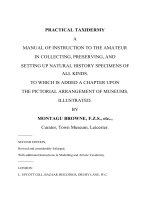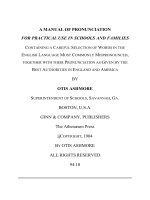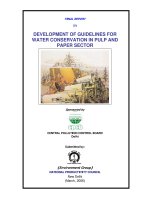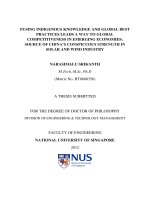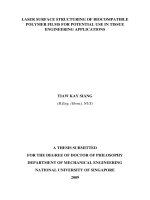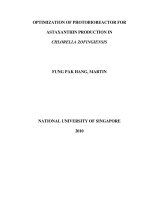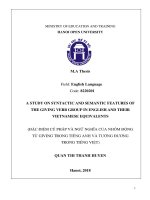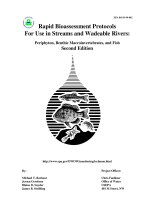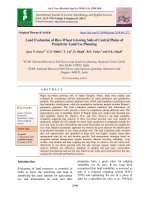A MANUAL OF PRONUNCIATION FOR PRACTICAL USE IN SCHOOLS AND FAMILIES CONTAINING A CAREFUL SELECTION pdf
Bạn đang xem bản rút gọn của tài liệu. Xem và tải ngay bản đầy đủ của tài liệu tại đây (1.34 MB, 156 trang )
A MANUAL OF PRONUNCIATION
FOR PRACTICAL USE IN SCHOOLS AND FAMILIES
CONTAINING A CAREFUL SELECTION OF WORDS IN THE
ENGLISH LANGUAGE MOST COMMONLY MISPRONOUNCED,
TOGETHER WITH THEIR PRONUNCIATION AS GIVEN BY THE
BEST AUTHORITIES IN ENGLAND AND AMERICA
BY
OTIS ASHMORE
SUPERINTENDENT OF SCHOOLS, SAVANNAH, GA.
BOSTON, U.S.A.
GINN & COMPANY, PUBLISHERS
The Athenæum Press
iiCOPYRIGHT, 1904
BY OTIS ASHMORE
ALL RIGHTS RESERVED
94.10
PREFACE
Nothing so quickly or so certainly reveals the character of our culture and early
associations as our speech. The persistence of habits formed in youth, especially bad
habits of pronunciation, is well known, and the correction of such faults in adult life is
a matter of considerable care and effort.
This manual has been prepared for practical use in the school-room and for the use of
families and individuals who value a correct pronunciation of the English language.
Several important features of this manual have justified its preparation. First, the
number of words presented has been limited to those most frequently mispronounced,
thus reducing the book to a practical working field at small cost. Many of the words in
most books on orthoepy are very rarely mispronounced, and they serve only to cumber
the work. Those who desire an exhaustive reference book should consult the
dictionaries. Second, the plan of exhibiting the weight of authorities where authorities
differ is of great practical value. In these cases the typography and the arrangement
are such as to prevent confusion. It is certainly desirable to know the weight of
authority that prefers one of two or more authorized pronunciations. A glance at the
page will show at once what company we keep. Third, the drill columns of unmarked
words in the back of the book will be appreciated by every teacher. The attempt to
teach orthoepy without much drill and practice is of little use. It is not enough to tell
pupils how words are pronounced; they must be drilled by abundant practice in order
to fix the correct pronunciation in the memory. Under the head of "How to Use the
Book" this use of the drill columns is fully illustrated. Fourth, in case of those words
about whose ivpronunciation there is no difference of opinion among the authorities
the fact is indicated by a star opposite these words. It is a source of much satisfaction
to know that many words,
asalbumen, address, coadjutor, divan, horizon, harass, idea, incisive, inquiry, leisure,
opponent, etc., have only one authorized pronunciation, and that all other
pronunciations are without any authority whatever.
There is another class of words concerning whose pronunciation there is some slight
difference of opinion but the weight of authority is overwhelmingly in favor of some
one particular form. The plan of this book enables the student to see at once the
strength or weakness of his position in regard to the pronunciation of such words, and
to choose the form supported by the best authority. This may be illustrated by such
words
as abdomen, acclimate,appendicitis, candelabrum, data, finance, ignoramus, gratis,
etc.
There are many words in our language about whose pronunciation the best orthoepists
and lexicographers differ greatly. In some cases it is very difficult to determine what
form should be preferred. It is well that we should know these words and the
differences of opinion concerning their pronunciation in order that we may give due
credit to those who may use a different form of pronunciation from that adopted by
ourselves.
"The ultimate standard of pronunciation for the English language is the usage that
prevails among the best-educated portion of the people to whom the language is
vernacular; or, at least, the usage that will be most generally approved by them."
Campbell's law of the good usage of a word applies with much force to its
pronunciation. This law requires this usage to be, first, reputable, or the practice of
intelligent and educated persons; second, national, as opposed to provincial or
foreign; third, present, or the usage of the generation in which we live.
As representing the best usage in pronunciation, ten of the best dictionaries of the
English language published in this country and in England have been selected for
reference. The scholarship, labor, and care displayed in these works entitle them to our
highest vrespect. Many other authorities have been freely consulted, but the resultant
of the opinions of those named is rarely changed by the consideration of any others.
Many important and obvious considerations justify us in assigning different values to
the authorities quoted. In determining the preferred form of pronunciation in the
following pages due weight has been given to all these considerations, with the
feeling, however, that in the case of a few words a different form from that indicated
might with equal propriety be preferred and used by others.
In cases where there is a marked difference in the English and the American usage,
and yet nearly an average balance, the preference has been given to the latter.
The compiler has not presumed to give any weight of authority whatever to his own
views in determining the pronunciation of words, but he has sought rather to present
the views of others who are justly entitled to our highest respect.
OTIS ASHMORE.
MARCH, 1904.
vi
vii
HOW TO USE THE BOOK
Success in teaching this book depends very largely upon frequent short drills. Daily
lessons are far better than one or two lessons a week. The plan should be to advance
slowly and review rapidly. Every pupil should have a book.
The teacher should first assign a lesson of from ten to twenty words daily, and go over
the lesson with the pupils, pronouncing each word distinctly and giving such other
instruction as may be needed.
In preparing the lesson the pupil should learn and adopt the preferred pronunciation
only, using the other forms for reference and general information.
In the back of the book will be found a list of all the words given in this manual
arranged in order corresponding to the pages and numbered accordingly for
convenient reference, but the words are without diacritical marks. This list is intended
for use in recitation and drill.
In conducting the recitation, have the pupils in turn pronounce from this drill list the
words assigned for the lesson. While the pupil who is reciting is thus engaged, the
other members of the class should follow closely with their eyes the words that are
diacritically marked in the body of the book, in order that the eye memory as well as
the ear memory may be utilized in fixing the desired impressions upon the mind.
Corrections may be made in the usual way. Every recitation should include a rapid
review of from one hundred to two hundred of the words previously learned. This
review is essential.
viii
Written recitations at stated times are desirable. The unmarked words may be written
upon the blackboard, and the pupils may be required to copy them, placing the accent
and diacritical marks in the proper places. Other methods will readily suggest
themselves.
If the pupils are not already familiar with the diacritical marks they should be
thoroughly taught before beginning with the words.
ix
KEY TO THE PRONUNCIATION
ā as in fāte ō as in nōte
ă " făt ŏ " nŏt
â " fâir ô " nôr
ä " fär o̤ " do̤
ȧ " fȧst ọ " wọlf
a̤ " fa̤ ll ȯ " sȯn
ạ " whạt
o͞ o
"
fo͞ od
a " fī´nal
o͝ o
"
fo͝ ot
ē " mēte ū " ūse
ĕ " mĕt ŭ " ŭs
ẽ " hẽr ṳ " rṳle
ê " thêre ụ " fụll
e̱ " pre̱ y û " ûrge
e " rē´cent
ī " pīne ȳ " flȳ
ĭ " pĭn
y̆
"
ny̆ mph
ï " ma-chïne´ ỹ " mỹrrh
ĩ " bĩrd
The symbol ⊥ placed over a vowel indicates the long sound of that vowel shortened,
or without the vanish. It is used in unaccented syllables, as in sĕn´[+a]te, [+e]-vĕnt´,
[+i]-dē´a, [+o]-bey´, [+u]-nīte´.
oi as in oil x̝ like gz ex̝ ist
ou " out [th] as in [th]is
th " thin
ç, soft, like s çede ṉ like ng
c̶, hard, like k c̶all ɴ,
nasal tone (as in French) of the
preceding vowel, as in encore
(äɴ´k[+o]r´)
ḡ, hard, as in ḡet
ġ, soft, like j ġem
s like z has '
(for voice glide), as in often
(ŏf´'n)
EXPLANATIONS
The authorities quoted and the abbreviations representing them are as follows:
Wb. Webster's International Dictionary, 1890, with Supplement.
Wr. Worcester, 1859, with Supplement, 1882.
St. The Standard Dictionary.
C. The Century Dictionary.
M. The New English Dictionary, by Murray, now in preparation.
Of the ten volumes proposed for this great work six have been issued up to date.
E. The Encyclopædic Dictionary, by Hunter, 1879-1888.
I. The Imperial Dictionary, 1883.
S. Stormonth's Dictionary.
Sm. Smart, edition of 1874.
Wk. Walker, edition of 1809.
A star * placed opposite a word signifies that all authorities agree on the one
pronunciation given, or that any difference of opinion is so slight as not to deserve
attention.
The figures opposite the words signify the preferences of the authorities under which
they stand. The figure 1 indicates the preferred pronunciation, or first choice; 2
indicates the second choice; 3, the third choice, etc. In all the authorities quoted the
order of preference of the author is assumed to be indicated by the order in which the
different forms of pronunciation are given by that author.
0 signifies that the form of pronunciation given opposite it is not given at all by the
author under which the 0 occurs.
n. indicates
noun; v. verb; adj. adjective; part. participle; adv. adverb; intj. interjection.
1
AMERICAN ENGLISH
W
b.
W
r.
S
t.
C
.
M
.
E
.
I
.
S
.
S
m.
W
k.
abdomen
ăb-dō
´
mĕn
1 1 1 1
1 1
1
1
1 1
ăb´d[+o]-mĕn
0 0 0 2
0 2
2
0
0 0
absolutory
ăb-sŏl
´
[+u]-t[+o]-
ry̆
1 0 1 1
1
0 0
ăb-sŏl´u-tŭr-e
0 1 0 0
0
1 1
abstemious
ăb-stē
´
mĭ-ŭs, not -
stĕm´-
*
accent
n. ăk
´
sĕnt´ *
accent
v. ăk-sĕnt
´
*
accessory
ăk-sĕs
´
s[+o]-
ry̆
1 0 1 1
2 0
0
0
0 0
ăk´sĕs-s[+o]-
ry̆
0 1 0 2
1 0
1
0
0 1
ăk´sĕs-sûr-
y̆
0 0 0 0
0 1
0
1
1 0
acclimate
ăk-klī
´
māt
1 1 1 1
1 0
1
1
not ăk´klĭ-māt
ăk-klī´mȧt
0 0 0 0
0 1
0
0
acetic
[1]
ȧ-sĕt
´
ĭk
2 1 1 1
2 1
1
1
1
ȧ-sē´tĭk
1 0 0 2
1 2
0
0
0
acoustics
ȧ-kous
´
tĭks
1 1 2 2
2 1
1
1
1 1
ȧ-
ko͞ os´tĭks
2 0 1 1
1 2
0
0
0 0
acumen
ȧ-
kū´mĕn, not ăk´[+u]-
mĕn
*
address
n., v. ăd-drĕs
´
*
adept
ȧ-dĕpt
´
1 1 1 1
1 2
1
ăd´ĕpt
0 0 0 0
0 1
0
adipose
ăd
´
ĭ-pōs´, not -pōz
1 0 1 1
0 1
1
1
1
ăd-ĭ-pōs´
0 1 0 0
1 0
0
0
0
2
adobe
ȧ-dō´b[+a] *
adult
ȧ-dŭlt´
1 1 1 1
1 2
1
ăd´ŭlt
0 0 0 0
0 1
0
adverse
ăd´vērs, not ăd-vẽrs´
*
advertisement
ăd-vẽr´tĭz-ment
1 1 2 1
1 1
1
1
1 1
ăd-vẽr-tīz´ment
2 2 1 2
2 2
0
0
0 2
after
ȧft´ẽr *
again
ȧ-gĕn´
1 1 1 1
1 2
1
1
1 1
ȧ-gān´
0 0 0 2
2 1
0
0
0 0
aged
adj. ā´jĕd *
(ājd
in compounds
only)
aggrandizement
ăg
´
grăn-dīz´ment
2 1 1 1
0 0
1
1
1 1
ăg-grăn´dĭz-ment
1 2 0 2
1 1
0
0
0 0
agile
ăj´ĭl *
alabaster
ăl
´
ȧ-băs´tēr, *
not ăl-ȧ-băs´tẽr
albino
ăl-bī´n[+o]
1 1 1 1
2 1
1
1
1
ăl-bē´n[+o]
0 2 0 0
1 2
0
0
0
albumen
ăl-bū´mĕn *
not ăl´bŭ-mĕn
alkali
ăl´kȧ-lĭ
2 1 1 1
1 1
1
1
[+
e]
ē
ăl´kȧ-lī
1 2 0 2
0 0
0
0
0 0
alkaline
ăl´kȧ-lĭn
2 1 1 1
0 0
0
1
1 1
ăl´kȧ-līn
1 2 0 2
1 1
1
0
0 0
allopathy
ăl-lŏp´ȧ-
thy̆
*
ally
ăl-lī´, not ăl´lī. So ăl-
līes´
*
alma
mater
[2]
ăl´mȧ mā´tẽr *
almond
ä´mŭnd
1 1 1 1
1
1
1
ăl´mŭnd
0 0 2 2
0
0
0
alpaca
ăl-păk´ȧ *
3
altercation
ăl-tẽr-kā´shŭn
1 1 1 1
1 0
1
1
1 1
a̤ l-tẽr-kā´shŭn
0 0 0 0
0 1
0
0
0 0
alternate
n., adj. ăl-tẽr´n[+a]t
1 1 1 1
1 0
1
1
1 1
a̤ l-tẽr´n[+a]t
0 0 0 0
2 1
0
0
0 0
alternate
v. ăl´tẽr-nāt
1 2 1 1
1 0
1
0
0 0
ăl-tẽr´nāt
2 1 0 0
0 0
2
1
1 1
a̤ l-tẽr´nāt
0 0 0 0
2 2
0
0
0 0
a̤ l-tẽr´n[+a]t
0 0 0 0
0 1
0
0
0 0
amateur
ăm´ȧ-tẽr
´
1 2 1 0
1
ăm
´
ȧ-tūr´
2 0 0 1
2
ăm-ȧ-tūr´
0 1 0 2
0
amen
ā´mĕn
´
*
(ä´mĕn
´
in singing)
amenable
ȧ-mē
´
nȧ-b'l, *
not ȧ-mĕn
´
ȧ-b'l
ampere
ăm-pār´ *
anchovy
ăn-
chō´vy̆
, not ăn-
kō´vy̆
*
anemone
ȧ-nĕm´[+o]-n[+e] *
animalcule
ăn´ĭ-măl
´
k[+u]l *
antipodes
ăn-tĭp´[+o]-dēz *
apotheosis
ăp´[+o]-thē
´
[+o]-sĭs
1 1 1 1
1 0
2
1
1 1
ăp´ŏ-thē-ŏ
´
sĭs
0 0 0 2
0 0
1
0
0 0
ȧ-pŏth-ĕ-ō´sĭs
0 0 0 0
2 1
0
0
0 0
apparatus
ăp´pȧ-rā
´
tŭsv
1 1 1 1
1
ăp´pȧ-rȧ
´
tŭs
0 0 2 0
0
apparent
ăp-pâr´ent
1 1 0 1
2 1
0
ăp-pār´ent
0 0 1 0
1 0
1
appendicitis
ăp-pĕnd´ĭ-sī
´
tĭs
1 0 1 1
0
ăp-pĕn-dĭ-sē´tĭs
0 0 2 0
0
apricot
ā´prĭ-kŏt
1 1 1 1
1 1
1
āp´rĭ-kŏt
0 0 0 2
0 0
0
4
apron
ā´prŭn
2 2 1 1
1 1
1
1 0
ā´pŭrn
1 1 2 2
2 0
0
2 1
apropos
ăp-r[+o]-pō´
0 1 1 1
1
ăp´r[+o]-pō´
1 2 0 0
0
aquiline
ăk´wĭ-lĭn
1 1 1 1
1 0
0
1
1 1
ăk´wĭ-līn
2 2 0 2
2 1
1
0
0 0
arbitrament
är-bĭt´rȧ-ment *
architect
är´kĭ-tĕkt *
archives
är´kīvs
1 1 1 1
1 1
1
är´kĭvs
0 0 0 2
2 0
0
arctic
ärk´tĭk, not är´tĭk *
area
ā´r[+e]-ȧ
1 1 1 1
0 0
1
1
1 1
âr´ĕȧ
0 0 0 0
1 1
0
0
0 0
armada
är-mā´dȧ
1 1 1 1
1
är-mä´dȧ
2 0 2 0
0
asphalt
n. ăs´fălt, not ăs´fa̤ lt
1 0 1 1
0 1
0
ăs-fălt´
2 1 0 2
1 0
1
aspirant
ăs-pīr´ant
1 1 1 1
1 1
1
1
1
ăs´pĭ-rant
0 2 0 2
0 0
0
0
0
assignee
ăs´sĭ-nē
´
*
attaché
ȧt´tȧ´sh[+a]
´
*
audacious
a̤ -dā´shŭs *
automobile
a̤ ´t[+o]-mō
´
bĭl
1 0 0 1
0
a̤ ´t[+o]-m[+o]-bēl
´
0 0 1 0
0
avalanche
ăv
´
ȧ-lănch´
1 0 1 1
1 0
1
1
0
ăv´ạ-länch
0 1 0 0
0 0
0
0
1
ăv-ạ-länch´
0 2 0 0
0 1
0
0
0
aye (in voting)
äĭ *
aye (always)
ā *
azure
ăzh´ụr
1 2 1 1
1 1
0
0
0 0
ā´zhụr
2 1 0 2
2 0
1
1
1 1
5
bade
băd, not bād *
balcony
băl´k[+o]-
ny̆
1 1 1 1
1 1
1
1
1 0
băl-
kō´ny̆
0 2 0 0
0 1
0
0
0
ballet
băl
´
l[+a]´
1 0 1 1
1 1
1
1
băl´lĕt
2 2 0 2
2 2
0
0
băl-lā´
0 1 0 0
0 0
0
0
banana
bȧ-nä´nȧ
1 2 1 0
1 1
1
0
0 0
bȧ-nā´nȧ
0 1 0 0
0 0
0
1
1 1
bȧ-năn´ȧ
0 0 0 1
0 0
0
0
0 0
banquet
băng´kwĕt *
basalt
bȧ-sa̤ lt´, not bā´sa̤ lt
1 1 1 1
1 1
1
băs´a̤ lt
0 0 0 2
2 0
0
bas-relief
bä´r[+e]-lēf
´
1 0 1 1
bȧs´r[+e]-lēf
´
0 0 2 2
băss´r[+e]-lēf
´
0 1 0 0
baton
băt´tŭn
1 2 1 1
1 1
1
2
bä´tôɴ
´
, Fr.
2 1 0 3
2 0
0
1
bă-tŏn´
0 0 0 2
0 0
0
0
bayou
bĭ´o͞ o
1 1 1 1
1
bī´ō
0 2 0 0
0
been
bĭn
1 1 1 2
2 0
0
1
1
bēn
0 0 0 1
1 1
1
0
0
belles-lettres
bĕl-lĕt´tẽr *
beloved
part. b[+e]-lŭvd´ *
beloved
n., adj. b[+e]-lŭv´ĕd *
beneath
b[+e]-nēth´
2 0 1 1
1 1
1
1
0 0
b[+e]-nēth´
1 1 0 0
0 0
0
0
1 1
bequeath
b[+e]-kwē[th]´ *
bestial
bĕs´chal
1 0 0 1
1 1
0
0
bĕst´yạl
0 1 1 0
0 0
1
1
bicycle
bī
´
sĭ-k'l
1 1 1
1
6biography
b[+i]-ŏg´rȧ-
fy̆ ,not bē-,nor bĭ-
*
bissextile
bĭs-sĕks´tĭl *
bitumen
bĭ-tū´mĕn
1 1 1 1
1 1
1
bĭt´[+u]-mĕn
0 0 0 0
2 2
0
bivouac
bĭv´wăk
1 1 0 0
1 0
0
0
bĭv´o͝ o
-ăk
2 2 1 1
2 1
1
1
blanc-mange
blä-mäɴzh´ *
blessed
part. blĕst *
blessed
adj. blĕs´ĕd *
boatswain
bōt´sw[+a]n
1 1 1 1
1
1
bō´s'n,
colloq. or
naut.
2 2 2 2
2
2
bombast
bŏm´bȧst
1 0 1 1
1 1
1
0
0 0
bŭm´bȧst
2 2 0 2
2 0
0
0
0 1
bŭm-bȧst´
0 1 0 0
0
0
1
1 0
bonbon
bôɴ
´
bôɴ´, Fr. *
bon ton
bôɴ
´
tôɴ´, Fr. *
boudoir
bo͞ o´dwôr´
, Fr. *
boulevard
bo͞ o
´
l[+e]-värd´
2 1 1 1
0
bo͞ o
´
lẽ-vär´
1 0 0 0
1
bo͞ ol
´
vär, Fr.
0 0 0 2
2
bouquet
bo͞ o
-kā´
1 1 1 1
1 0
0
0
0
bo͞ o´kā
0 2 0 0
2 1
1
1
1
bourn
bōrn
1 1 1 1
1 0
2
0
1 1
bo͞ orn
2 2 0 2
0 1
1
1
0 0
bovine
bō´vīn
1 1 0 2
1 1
1
b[+o]´vĭn
0 0 1 1
0 0
0
bravado
brȧ-vā´d[+o] *
bravo
intj. brä´v[+o]
1 1 1 1
brā´vō
0 2 0 0
bravo
n. brā´v[+o]
1 2 1 1
0 0
1
0
0 0
brä´v[+o]
0 1 2 0
1 1
0
1
1 1
7
brethren
brĕth´rĕn, *
not brĕth´er-ĕn
brigand
brĭg´and, not brĭ-
gănd´
*
brigantine
brĭg´ăn-tīn
1 1 0 2
0 0
0
0
brĭg´ăn-tĭn
0 0 1 1
0 0
1
1
brīg´ăn-tēn
0 0 0 0
1 1
0
0
bromide
brō´mĭd
1 1 1 1
0 0
2
1
brō´mīd
2 0 0 2
1 1
1
0
bromine
brō´mĭn
1 1 1 1
1 0
1
brō´mīn
0 0 0 0
2 1
0
brō´mēn
2 0 0 0
0 0
0
bronchitis
brŏn-kī´tĭs
1 1 0 0
1
brŏng-kī´tĭs
0 0 1 1
0
brong-kē´tĭs
0 0 2 0
0
brooch
brōch
1 1 1 1
1 1
1
1
1 1
bro͞ och
0 0 2 2
0 0
0
0
0 0
brusque
bro͝ osk
*
buoy
boi
2 2 1 1
1 1
1
1
0 0
bwoi
1 1 0 0
2 0
2
0
1 1
bo͞ oy
0 0 0 2
0 0
0
0
0 0
burro
bụr´r[+o] *
cadaver
kȧ-dā´vẽr
1 1 1 0
1
1
kȧ-dȧ´vẽr
0 0 2 0
0
0
kȧ-dă´vẽr
0 0 0 1
0
0
calcine
kăl-sīn´
1 1 0 2
1 0
1
0
1 1
kăl´sĭn
2 0 1 1
0 0
0
0
0 0
kăl´sīn
0 0 0 0
0 1
0
1
0 0
calliope
kăl-lī´[+o]-p[+e], *
not kăl´lĭ-ōp
calm
käm *
caloric
kȧ-
lŏr´ĭk, not kăl´[+o]-
rĭk
*
8
camelopard
kȧ-mĕl´[+o]-pärd
1 1 1 1
2 0
1
1
0 1
kăm´ĕl-[+o]-pärd
2 2 0 2
1 0
2
0
1 0
kăm´ĕl-lĕp
´
ȧrd
0 0 0 0
0 1
0
0
0 0
candelabrum
kăn´d[+e]-lā
´
brŭm
1 1 1 1
1
kăn-d[+e]-lȧ´brŭm
0 0 2 0
0
canine
kȧ-nīn´
1 1 1 1
1 0
1
kā´nīn
0 0 0 2
0 0
0
kȧ´nīn
0 0 0 0
0 1
0
kăn´īn
0 0 0 0
2 0
0
cantata
kȧn-tä´tȧ
1 2 1 1
1 1
1
0
0 0
kȧn-tā´tȧ
0 1 0 0
0 0
0
1
1 1
caoutchouc
ko͞ o´cho͞ ok
1 1 0 0
1
ko͞ o´cho͝ ok
0 0 1 1
0
caprice
kȧ-prēs´ *
caret
kā´rĕt
1 1 0 1
2 0
1
kăr´ĕt
2 0 1 0
1 1
0
carmine
kär´mīn
1 1 0 2
0 0
1
1
0 0
kär´mĭn
0 0 1 1
1 1
0
0
0 0
kar-mīn´
0 2 0 0
0 0
0
0
1 1
caricature
kăr´ĭ-kȧ-tūr
1 1 2 0
1
n
.
0
1
0 0
kăr´ĭ-kȧ-tūr´
0 2 0 0
0
v
.
1
0
1 0
kăr-ĭk-ă-chūr´
0 0 0 0
0 0
0
0
0 1
kăr´ĭ-kȧ-chūr
0 0 1 1
0 0
0
0
0 0
casement
t kās´men
1 0 1 1
1 1
0
1
0 0
kāz´ment
0 1 0 2
2 0
1
0
1 1
cayenne
k[+a]-ĕn´
1 1 1 0
1
ki-ĕn´
2 0 0 0
2
kā´ĕn
0 0 0 1
0
cement
n. s[+e]-mĕnt´
1 0 1 1
1 1
1
1
1 0
sĕm´ĕnt
2 1 0 2
2 0
0
0
0 1
cerebrum
sĕr´[+e]-
brŭm, not s[+e]-
rē´brŭm
*
9cerement
sēr´ment, not sĕr'[+e
]-ment
*
certain
sẽr´tĭn, not sẽrt'n *
chagrin
shȧ-grĭn´
1 0 1 1
1 1
0
0
0 0
shȧ-grēn´
2 1 0 2
2 0
1
1
1 1
chaise
shāz *
chamois
shăm´my̆
1 1 1 2
2 0
0
0
0 0
shăm´wä
0 0 0 1
0 1
1
1
1 0
shȧ-moi´
2 2 0 0
0 0
2
0
0 1
shăm´oi
0 0 0 0
1 0
0
0
0 0
chaperon
shăp´ẽr-ōn
1 1 1 1
0 1
0
shăp´ẽr-ŏn
0 0 0 0
1 0
1
chaps
(the jaws) chŏps *
charlatan
shär´lȧ-tan *
chasten
chā´s'n, not chăs´'n *
chastisement
chăs´tĭz-ment, not -
tīz´
*
chivalric
shĭv´al-rĭk
1 0 0 1
2 1
1
1
0
shĭ-văl´rĭk
0 1 0 0
1 0
0
0
1
chĭv´al-rĭk
0 0 1 0
0 0
0
2
0
chivalrous
shĭv´al-rŭs
1 1 0 1
1 1
1
1
1 0
chĭv´al-rŭs
0 2 1 0
0 0
0
2
0 1
chloride
klō´rĭd
1 1 1 1
1 0
0
1
0
klō´rīd
2 0 2 2
2 1
1
0
1
chlorine
klō´rĭn
1 1 1 1
1 0
2
1
1
klō´rīn
0 0 2 0
2 1
1
0
0
klō´rēn
2 0 0 0
0 0
0
0
0
chores
chōrz, not kōrz *
clematis
klĕm´ȧ-tĭs, not klĕm-
ăt´ĭs
*
coadjutor
kō´ăd-jū
´
tẽr *
cocaine
kō´kȧ-ĭn, not k[+o]-
kān´
*
coffee
kŏf´f[+e]
1 1 1 1
1 1
1
kôf´[+e]
0 0 0 2
0 0
0
10
cognizance
kŏ´gnĭ-zans
1 1 1 1
1 0
1
1
0 1
kŏn´ĭ-zans
2 2 0 2
2 0
2
2
1 2
kŏn´ĭ-zäns
0 0 0 0
0 1
0
0
0 0
cognomen
kŏg-
nō´mĕn, not kŏg´n[+
o]-mĕn
*
column
kŏl´ŭm, not kŏl´yŭm
*
comatose
kō
´
mȧ-tōs´
1 0 1 1
1 0
1
0
1 0
kŏm
´
ȧ-tōs´
2 0 0 0
0 1
0
0
0 0
kŏm-ȧ-tōs´
0 1 0 0
0 0
0
1
0 1
combat
kŏm´băt
1 2 1 1
1 0
1
0
0 0
kŭm´băt
2 1 0 2
2 1
2
1
1 1
combatant
kŏm´băt-ant
1 1 1 1
1
kŭm´ba-tant
0 0 0 2
2
commandant
kŏm´mȧn-dänt
´
*
comparable
kŏm
´
pȧ-rȧ-b'l *
compensate
kŏm-pĕn´sāt
2 1 0 1
1 2
1
1
1 1
kŏm´pĕn-sāt
1 0 1 2
2 1
2
0
0 0
comrade
kŏm´r[+a]d
2 1 0 2
1 0
1
1
1 0
kŏm´răd
1 0 1 1
0 0
0
0
0 0
kŭm´r[+a]d
0 2 0 4
0 0
0
0
0 1
kŭm´răd
0 0 0 3
0 1
0
0
0 0
concentrate
kŏn-sĕn´trāt
1 1 0 1
2 0
1
kŏn´sĕn-trăt
2 2 1 2
1 1
condolence
kŏn-dō´lence *
conduit
kŏn´dĭt
1 0 1 1
2 0
1
2
0 0
kŭn´dĭt
2 1 0 2
1 1
2
1
1 1
confidant
kŏn´fĭ-dănt
´
1 1 0 1
0 0
2
1
1 1
kŏn´fĭ-dănt
0 0 0 0
0 0
1
0
0 0
kŏn´fĭ-dänt
0 0 0 0
0 1
0
0
0 0
kŏn-fĭ-dȧnt´
0 0 1 0
1 0
0
0
0 0
confiscate
kŏn-fĭs´kāt
2 1 0 1
2 0
1
1
1 1
kŏn´fĭs-k[+a]t
1 0 1 2
1 1
2
0
0 0
11
connoisseur
kŏn´nĭs-sûr
´
1 2 1 2
1 1
0
1
1
kŏn-nĭs-sūr´
0 1 0 1
2 0
0
0
0
kŏn´nĭs-sṳr
´
2 0 0 0
0 0
0
0
0
kŏn´nĭs-sūr
0 0 0 0
0 0
1
0
0
conservator
kŏn
´
sēr-vā´tēr
1 1 1 1
1 0
2
1
1 1
kŏn-sẽr-vā´tẽr
0 0 0 0
0 0
1
0
0 0
kŭn-sẽr´vȧ-tûr
0 0 0 0
0 1
0
0
0 0
kŭn´sẽr-vā-tûr
0 0 0 0
0 2
0
0
0 0
conspiracy
kŏn-spĭr´ȧ-
sy̆
, not -
spī´-
*
construe
kŏn´strṳ
1 1 1 1
1 1
1
kŏn-strṳ´
0 0 0 2
2 0
0
consummate
v. kŏn-sŭm´māt
2 1 1 1
2 0
0
1
1 1
kŏn´sŭm-māt
1 0 0 2
1 1
1
0
0 0
consummate
adj. kŏn-sŭm´m[+a]t
1 1 1 1
1
kŏn´sŭm-m[+a]t
0 0 0 0
2
contemplate
kŏn-tĕm´plāt
2 1 1 1
2 1
1
1
1 1
kŏn´tĕm-plāt
1 0 0 2
1 2
2
0
0 0
contumely
kŏn´t[+u]-m[+e]-
ly̆ , not kŏn-tūme´
*
conversant
kŏn´vẽr-sant *
coop
ko͞ op
, not
ko͝ op
*
coral
kŏr´al, not kō´ral *
coronal
kŏr´[+o]-nal
1 2 1 1
2
1
k[+o]-rō´nal
2 1 0 2
1
0
cortége
kôr-t[+a]zh´ *
costume
kŏs-tŭm´
2 1 0 1
1 0
0
1
1
kŏs-tūm
1 0 1 2
2 1
1
2
0
coterie
k[+o]´te-r[+e]
´
*
courteous
kûr´t[+e]-ŭs
1 1 1 1
2 0
0
0
kōrt´yŭs
0 2 0 2
0 0
0
0
kōrt´[+e]-ŭs
0 0 0 0
1 1
1
0
kẽrt´yŭs
0 0 0 0
0 0
0
1
12
courtier
kōrt´yēr *
cowardice
cow´ẽrd-ĭs, not -īs *
crematory
krĕm´ȧ-t[+o]-
ry̆
1 0 0 0
1
krē´m[+a]-t[+o]-
ry̆
0 0 1 1
0
cuirass
kw[+e]-rȧs´
1 1 1 1
1 1
1
kwē´răs
2 2 0 2
0 0
0
cuisine
kw[+e]´z[+e]n
´
*
curator
k[+u]-rā´tẽr *
cylindric
sĭ-lĭn´drĭk *
cynosure
sī´n[+o]-shṳr
1 1 1 1
2 1
1
1
1 2
sĭn´[+o]-shṳr
2 2 0 2
1 0
0
0
0 1
dahlia
däl´yȧ, not dăl´yȧ
1 1 1 1
1
dāl´yȧ
2 0 0 0
2
dais
dā´ĭs
1 1 1 1
2
dās
0 0 2 0
1
Danish
Dān´ĭsh, not Dăn´ĭsh
*
data
dā´tȧ, not dăt´ȧ
1 1 1 1
1
dȧ´tȧ
0 0 2 0
0
datum
dā´tŭm
1 1 1 1
1
dȧ´tŭm
0 0 2 0
0
daunt
dänt
1 1 1 1
0 0
0
0
1 1
da̤ nt
0 0 0 2
1 1
1
1
0 0
deaf
dĕf
1 1 1 1
1
1
dēf
2 0 0 2
0
0
debauchee
dĕb´[+o]-shē
´
1 1 1 1
1
d[+a]´b[+o]´sh[+a]
´
2 0 2 0
0
débris
d[+a]´br[+e]
´
1 1 1 0
1
dĕb-rē´
0 0 2 1
2
début
d[+a]´bụ
´
*
débutant
d[+a]´bụ´täɴ
´
*
decade
dĕk´[+a]d, not dē´k[
+a]d
*
13
decadence
d[+e]-kā´dence *
décolleté
d[+a]´kŏl´le-t[+a]
´
*
decorative
dĕk´[+o]-rȧ-tĭv
1 1 1 0
0
dĕk´[+o]-r[+a]-tĭv
2 0 2 1
1
decorous
d[+e]-kō´rŭs
1 1 1 1
1 1
1
1
1 1
dĕk´[+o]-rŭs
2 2 0 2
2 2
0
0
0 0

